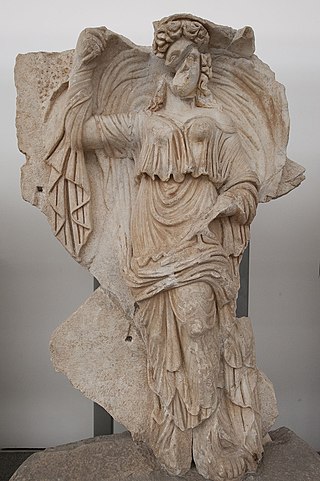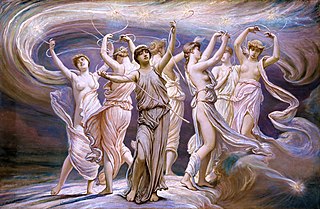Related Research Articles

In Greek mythology, Menelaus was a king of Mycenaean (pre-Dorian) Sparta. According to the Iliad, Menelaus was a central figure in the Trojan War, leading the Spartan contingent of the Greek army, under his elder brother Agamemnon, king of Mycenae. Prominent in both the Iliad and Odyssey, Menelaus was also popular in Greek vase painting and Greek tragedy, the latter more as a hero of the Trojan War than as a member of the doomed House of Atreus.
In Greek mythology, Oicles or Oecles, also Oicleus or Oecleus, was the father of the seer Amphiaraus. He accompanied Heracles on his campaign against Troy.
In Greek mythology, Catreus or Katreus was the eldest son of Minos and Pasiphaë, and Minos' successor as king of Crete. Catreus had one son, Althaemenes, and three daughters, Apemosyne, Aerope and Clymene. Catreus was mistakenly killed by his son Althaemenes thereby fulfilling an oracle's prophecy.

In Greek mythology, Aerope was a Cretan princess as the daughter of Catreus, king of Crete. She was the sister to Clymene, Apemosyne and Althaemenes. Aerope's father Catreus gave her to Nauplius, to be drowned, or sold abroad, but Nauplius spared her, and she became the wife of Atreus, or Pleisthenes, and by most accounts the mother of Agamemnon and Menelaus. While the wife of Atreus, she became the lover of his brother Thyestes, and gave Thyestes the golden lamb, by which he became the king of Mycenae.
In Greek mythology, Pleisthenes or Plisthenes, is the name of several members of the house of Tantalus, the most important being a son of Atreus, said to be the father of Agamemnon and Menelaus. Although these two brothers are usually considered to be the sons of Atreus himself, according to some accounts, Pleisthenes was their father, but he died, and Agamemnon and Menelaus were adopted by their grandfather Atreus.

In Greek mythology, Hemera was the personification of day. According to Hesiod, she was the daughter of Erebus (Darkness) and Nyx (Night), and the sister of Aether. Though separate entities in Hesiod's Theogony, Hemera and Eos (Dawn) were often identified with each other.

In Greek mythology, Electra was one of the Pleiades, the seven daughters of Atlas and Pleione. She lived on the island of Samothrace. She had two sons, Dardanus and Iasion, by Zeus.
In Greek mythology, Thoas ,") a king of Aetolia, was the son of Andraemon and Gorge, and one of the heroes who fought for the Greeks in the Trojan War. Thoas had a son Haemon, and an unnamed daughter.
In Greek mythology, Nauplius is the name of one mariner heroes. Whether these should be considered to be the same person, or two or possibly three distinct persons, is not entirely clear. The most famous Nauplius, was the father of Palamedes, called Nauplius the Wrecker, because he caused the Greek fleet, sailing home from the Trojan War, to shipwreck, in revenge for the unjust killing of Palamedes. This Nauplius was also involved in the stories of Aerope, the mother of Agamemnon and Menelaus, and Auge, the mother of Telephus. The mythographer Apollodorus says he was the same as the Nauplius who was the son of Poseidon and Amymone. Nauplius was also the name of one of the Argonauts, and although Apollonius of Rhodes made the Argonaut a direct descendant of the son of Poseidon, the Roman mythographer Hyginus makes them the same person. However, no surviving ancient source identifies the Argonaut with the father of Palamedes.
In Greek mythology, Pronax was one of the sons of Talaus and Lysimache, a brother of Adrastus and Eriphyle, and the father of Lycurgus and Amphithea. According to some accounts, he died before the war of the Seven against Thebes, and the Nemean Games were instituted in his honor.
In Greek mythology Adrastus or Adrestus, , usually refers to:

In Greek mythology, Chione was the daughter of Boreas, the god of the north wind, and Orithyia a daughter of Erechtheus, king of Athens.
In Greek mythology, Cepheus was a king of Tegea in Arcadia. He was an Argonaut, and was, along with most of his twenty sons, killed in Heracles' war against Hippocoon, king of Sparta. He was perhaps the same Cepheus who, according to the mythographer Apollodorus, participated in the Calydonian boar hunt.
In Greek mythology, Nicostratus is a son of Menelaus, king of Mycenaean Sparta. He was known to Hesiod and epic poet Cinaethon. His name means 'Victorious Army' and suggests that his birth came after the Trojan War.

In Greek mythology, Eurypylus ("Broadgate") was the son of Telephus, king of Mysia. He was a great warrior, who led a Mysian contingent that fought alongside the Trojans against the Greeks in the Trojan War. He killed Machaon, and was himself killed by Achilles' son Neoptolemus.
In Greek mythology, Mycene or Mykene, was a daughter of Inachus, king of Argos, the sister of Phoroneus, and the wife of Arestor. She was said to be the eponym of Mycenae.
In Greek mythology, Aeolus or Aiolos was the son of Hellen, the ruler of Aeolia, and the eponym of the Aeolians, one of the four main tribes of the Greeks. According to the mythographer Apollodorus, Aeolus was the father of seven sons: Cretheus, Sisyphus, Athamas, Salmoneus, Deion, Magnes, Perieres, and five daughters: Canace, Alcyone, Pisidice, Calyce, and Perimede. He was said to have killed his daughter Canace because she had committed incest with her brother Macareus. This Aeolus was sometimes confused with the Aeolus who was the ruler of the winds.
In Greek mythology, Melia was an Oceanid, one of the 3,000 water nymph daughters of the Titans Oceanus and his sister-spouse Tethys. She was the mother of culture hero Phoroneus, and Aegialeus, by her brother Inachus, the river-god of Argos. However, in some accounts, Inachus fathered Phoroneus by an Oceanid nymph named Argia. According to Argive tradition, Phoroneus was the first man, or first inhabitant of Argos, who lived during the time of the Great Flood, associated with Deucalion.
In Greek mythology, Megapenthes, the illegitimate son of Menelaus, king of Mycenaean Sparta, by a slave. He married Alector's daughter, Iphiloche. His name means 'great sorrow'.
In Greek mythology, Pieris was one of the names given for the slave who was the mother, by Menelaus, of Megapenthes. Homer's Odyssey, and the geographer Pausanias, mention that Megapenthes was the illegitimate son of Menelaus, king of Mycenaean Sparta, by a slave, without naming her. But according to the mythographer Apollodorus:
References
- Apollodorus, Apollodorus, The Library, with an English Translation by Sir James George Frazer, F.B.A., F.R.S. in 2 Volumes. Cambridge, Massachusetts, Harvard University Press; London, William Heinemann Ltd. 1921. ISBN 0-674-99135-4. Online version at the Perseus Digital Library.
- Fowler, R. L. (2000), Early Greek Mythography: Volume 1: Text and Introduction, Oxford University Press, 2000. ISBN 978-0198147404.
- Fowler, R. L. (2013), Early Greek Mythography: Volume 2: Commentary, Oxford University Press, 2013. ISBN 978-0198147411.
- Grimal, Pierre, The Dictionary of Classical Mythology, Wiley-Blackwell, 1996. ISBN 978-0-631-20102-1.
- Homer, The Odyssey with an English Translation by A.T. Murray, PH.D. in two volumes. Cambridge, Massachusetts, Harvard University Press; London, William Heinemann, Ltd. 1919. Online version at the Perseus Digital Library.
- Pausanias, Pausanias Description of Greece with an English Translation by W.H.S. Jones, Litt.D., and H.A. Ormerod, M.A., in 4 Volumes. Cambridge, Massachusetts, Harvard University Press; London, William Heinemann Ltd. 1918. Online version at the Perseus Digital Library.
- Tripp, Edward, Crowell's Handbook of Classical Mythology, Thomas Y. Crowell Co; First edition (June 1970). ISBN 069022608X.